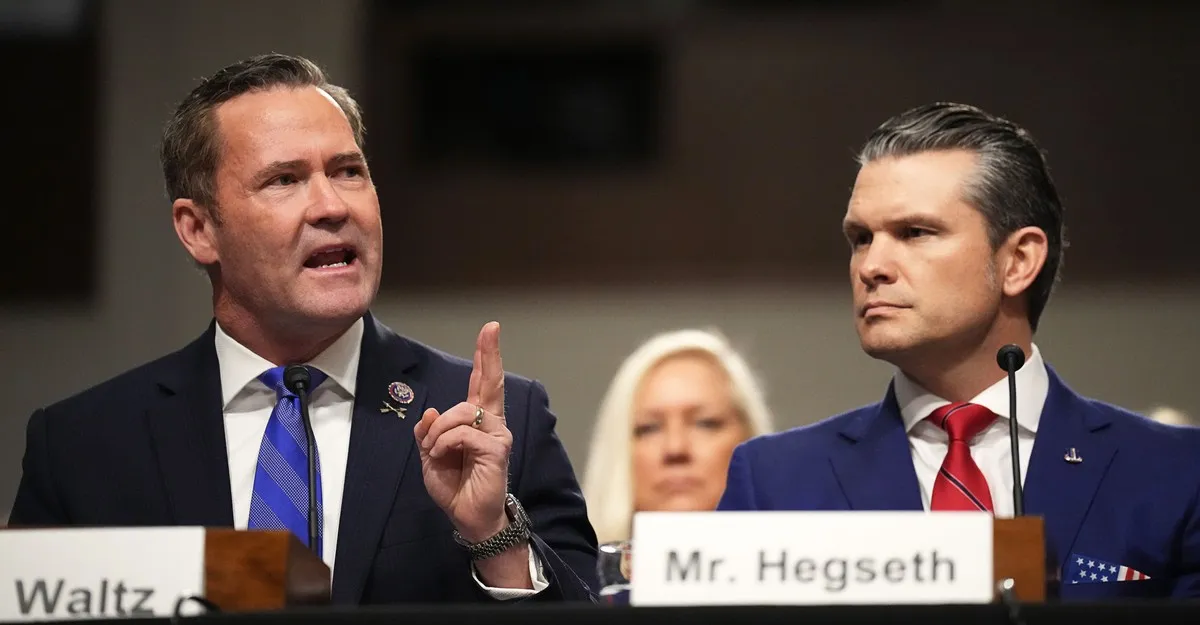
On Monday, a significant incident regarding a Signal chat emerged shortly after we published an article detailing a major security breach during the Trump administration. The Secretary of Defense, Pete Hegseth, was questioned about why he shared plans concerning a potential attack on Yemen through the Signal messaging app. His response was somewhat dismissive, stating, “Nobody was texting war plans. And that’s all I have to say about that.”
At a Senate hearing the following day, both Tulsi Gabbard, the Director of National Intelligence, and John Ratcliffe, the Director of the Central Intelligence Agency, were also asked about this Signal chat. Jeffrey Goldberg, the Editor in Chief of The Atlantic, was inadvertently invited to join the discussion by National Security Adviser Michael Waltz. Gabbard assured the Senate Intelligence Committee that, “There was no classified material that was shared in that Signal group.” Ratcliffe echoed her sentiment, stating, “My communications, to be clear, in the Signal message group were entirely permissible and lawful and did not include classified information.”
In light of these statements from Hegseth, Gabbard, Ratcliffe, and President Donald Trump—who commented that the information was not classified—we face a dilemma. Our initial article in The Atlantic regarding the Signal chat, referred to as the “Houthi PC small group” by Waltz, intentionally omitted specific details about weapons and attack timing. As a standard practice, we refrain from publishing military operational information that could endanger U.S. personnel. Consequently, we characterized the nature of the information shared rather than providing explicit details about the attacks.
The repeated assertions from various administration officials claiming that we misrepresented the content of the Signal texts have led us to believe that transparency is necessary. There is a significant public interest in disclosing the information shared by Trump advisers through unsecured communication channels, especially as senior officials attempt to minimize the importance of the messages exchanged.
Experts have consistently warned that using a Signal chat for sensitive discussions poses substantial national security risks. A prime example occurred when Goldberg received information regarding the attacks merely two hours before they were scheduled to commence on Houthi positions. Had this sensitive information—particularly regarding the exact times U.S. aircraft launched—been intercepted by adversaries during that critical two-hour window, it could have jeopardized the safety of American pilots and personnel.
The Trump administration contends that the military information contained in these Signal texts was not classified in the traditional sense; however, President Trump has yet to clarify how he arrived at this conclusion. In a bid for transparency, we reached out to officials throughout the Trump administration, inquiring if they objected to the publication of the full texts. Our correspondence included the assertion that, based on statements from multiple officials, including during the Senate Intelligence Committee hearing, the information in the Signal chain regarding the Houthi strike was not classified.
Following our inquiries, White House Press Secretary Karoline Leavitt responded, reiterating, “As we have repeatedly stated, there was no classified information transmitted in the group chat.” However, she added that the CIA Director and National Security Advisor expressed concerns regarding the release of the conversation, emphasizing that it was intended for internal discussions among senior staff and sensitive information was indeed discussed. Notably, Leavitt's statement did not clarify which elements of the texts were considered sensitive or how, over a week after the initial airstrikes, their publication could affect national security.
In addition, a CIA spokesperson requested that we withhold the name of John Ratcliffe’s chief of staff, which Ratcliffe had shared within the Signal chain, citing traditional practices of not publicly identifying CIA intelligence officers. Ratcliffe had previously testified that the officer was not undercover and deemed it “completely appropriate” to share their name in the context of the conversation.
As we noted earlier, much of the conversation in the “Houthi PC small group” revolved around the timing and justification for the attacks on Houthi positions, with remarks from Trump administration officials regarding the perceived inadequacies of America’s European allies. On the day of the attack—Saturday, March 15—the dialogue shifted to operational details. At 11:44 a.m. Eastern Time, Hegseth announced, in all capital letters, “TEAM UPDATE:” and proceeded with the message, “TIME NOW (1144et): Weather is FAVORABLE. Just CONFIRMED w/CENTCOM we are a GO for mission launch.”
This message highlights a critical point: the U.S. Secretary of Defense communicated sensitive information to a group that included a phone number unknown to him—Goldberg’s cellphone—31 minutes before the initial launch of U.S. warplanes. If this information had reached hostile entities, it could have compromised the surprise element of the planned attack on Houthi strongholds, potentially leading to catastrophic consequences for American pilots.
Following Hegseth's update, Vice President J. D. Vance texted, “I will say a prayer for victory.” Later, Waltz provided real-time intelligence updates, mentioning a collapsed building and multiple positive identifications of targets. The discussion continued with Vance seeking clarification and responding positively to the updates shared. Ultimately, the Houthi-run Yemeni health ministry reported at least 53 fatalities resulting from the strikes, a figure that remains unverified.
As the conversation unfolded, Hegseth noted, “CENTCOM was/is on point,” and indicated that further strikes would continue. “Great job all. More strikes ongoing for hours tonight, and will provide full initial report tomorrow. But on time, on target, and good readouts so far,” he stated.
As of now, it remains unclear why a journalist was included in this Signal chat. Waltz, who invited Goldberg, indicated that an investigation was underway to determine how he gained access to this sensitive group.